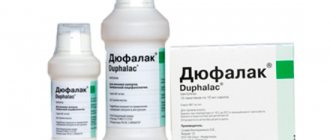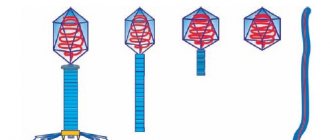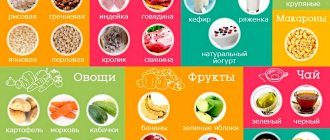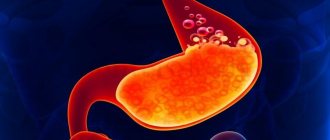Updated: 04/23/2021 15:29:34
Expert: Pogrebnoy Stanislav Leonidovich
*Review of the best according to the editors of expertology.ru. About the selection criteria. This material is subjective in nature, does not constitute advertising and does not serve as a purchase guide. Before purchasing, consultation with a specialist is required.
It would seem that there are many drugs to improve bowel function. But sometimes there is a situation when the necessary means are not at hand. What should you have in your home medicine cabinet to contain medications to improve bowel function? The answer to this question is far from simple. After all, over-the-counter drugs that are sold in the public domain are not prescribed by a doctor, but are used independently. This means that, first of all, they should not cause harm. Therefore, the rating of drugs for improving intestinal function did not include drugs from the group of antibiotics, since they are sold in the Russian Federation by prescription, and painkillers were not included.
Abdominal pain is a fairly common symptom, but the first commandment of a doctor is to never give painkillers. First of all, it is necessary to suspect a surgical disease, such as acute appendicitis. And if the severity of pain is reduced, this can lead to the progression of surgical pathology and the development of severe complications in the absence of pain, for example, purulent peritonitis.
The minimum list of medications that improve intestinal function includes sorbents that can be used for various intoxications, poisoning, and the development of diarrhea. These are eubiotics, or bacterial preparations that normalize intestinal function. Eubiotics are the most useful and safe group. They can be used by both adults and children: both healthy and those suffering not only from intestinal diseases, but also against the background of reduced immunity, with frequent colds and other pathologies.
The rating also includes several drugs that gently combat chronic constipation and improve peristalsis. The fact is that in the 21st century, among all dynamic intestinal disorders, what most often occurs is not spastic, but atonic constipation associated with poor nutrition, weight gain, and a sedentary lifestyle. Therefore, regular use of these medications if stool is delayed for 3 days or more will be beneficial.
Finally, the last group of drugs that improve intestinal function includes myotropic antispasmodics and drugs to combat bloating. If pain and discomfort in the abdomen are caused by muscle spasms, then these drugs will help reduce unpleasant symptoms, and they are not painkillers. Antispasmodics can be taken even if there is a suspicion of acute appendicitis, cholecystitis or pancreatitis.
Finally, anti-bloating medications are used in both adults and children. All other medications are prescribed only in accordance with strict indications, and of course, there are many more of them. But this minimum list of medications that are sold without a prescription should really be in every medicine cabinet. And in emergency situations associated with food poisoning, gastroenteritis, irritable bowel syndrome, and habitual constipation, they can significantly alleviate the course of the disease.
This rating of drugs for improving intestinal function includes drugs that are freely available in pharmacies of all forms of ownership in the Russian Federation. Prices for medicines are average, and they are valid at the beginning of April 2022.
Rating of the best drugs for the intestines
| Nomination | place | Name of product | price |
| Best Eubiotics for the Gut | 1 | Bifidumbacterin – monocomponent | 89 ₽ |
| 2 | Bifiform – Multicomponent | 442 ₽ | |
| 3 | Enterol | 324 ₽ | |
| 4 | Linex | 531 ₽ | |
| 5 | Maxilac | 448 ₽ | |
| The best sorbents for the intestines | 1 | Polysorb MP | 471 ₽ |
| 2 | Enterosgel | 416 ₽ | |
| 3 | Lactofiltrum | 378 ₽ | |
| Best Laxatives | 1 | Duphalac (Goodluck, Normaze, Lactusan) | 539 ₽ |
| 2 | Mukofalk | 620 ₽ | |
| 3 | Senade | 507 ₽ | |
| The best antispasmodics and antifoams FOR THE INTESTINES | 1 | NO-Shpa | 56 ₽ |
| 2 | Iberogast | 349 ₽ | |
| 3 | Espumisan | 318 ₽ |
Festal
The active ingredient of Festal is pancreatin (protease, lipase and amylase). It also contains bile components and hemicellulase, which breaks down fiber (normally it is produced by intestinal microflora). "Festal" improves the absorption of fats and fat-soluble vitamins, corrects biliary insufficiency (when the activity of the gallbladder is reduced or it is removed). This is a complex drug for improving digestion: Festal compensates for pancreatic insufficiency, helps with overeating, poor liver and gall function. The drug is indicated for biliary dyskinesia, cirrhosis, cholecystitis. "Festal" improves the breakdown of fiber, reduces bloating, and relieves flatulence. You can buy Festal in almost any pharmacy, its price is affordable.
Festal
Turk Hoest, India
— insufficiency of the exocrine function of the pancreas (including in chronic pancreatitis, cystic fibrosis);
— chronic inflammatory-dystrophic diseases of the stomach, intestines, liver, gall bladder; - as part of combination therapy for conditions after resection or irradiation of these organs, accompanied by impaired digestion of food, flatulence, diarrhea. from 63
977
- Like
- Write a review
The best eubiotics for the intestines
The ranking of popular drugs for improving intestinal function opens with legendary eubiotics. If you type “best drugs for the intestines” into a search engine, then almost all sites without exception will give you only drugs from this group. Why is this so? Because eubiotics contain those germs of microbial cells that make up the normal microflora of our intestines, take part in the production of certain vitamins, activate the immune system, protect the intestinal mucosa from the proliferation of pathogenic bacteria - in a word, protect the intestines and are useful cohabitants of the human body.
It is impossible to be a healthy person without intestinal microflora, and it populates the human intestines starting from the first days of his life. This rating will present eubiotics of several classes: monocomponent, multicomponent, containing several types of different microorganisms. When taking all eubiotics without exception, you should remember that these are living microorganisms, even if they are protected by a capsule or tablet. Therefore, it is strictly forbidden to drink them with hot drinks or alcohol.
Bifidumbacterin – monocomponent
Rating: 4.9
Bifidumbacterin contains only one type of beneficial microorganisms: bifidobacteria. The drug is available in capsules, and one capsule contains 5 conventional doses. These beneficial microbes, once in the intestines, begin to fight against harmful microorganisms that constantly attack us. Bifidobacteria fight against staphylococcal infection, pathogenic E. coli, Shigella dysentery, and pathogenic yeast. The fact that we very rarely get acute intestinal infections is thanks to our normal microflora. And only if tens and hundreds of millions of pathogenic microorganisms enter our body, then this line of defense will be broken through.
Bifidumbacterin is indicated for the treatment of various diseases of the gastrointestinal tract and for their prevention, after treatment with antibiotics, for the correction of reduced immunity. Bifidumbacterin should be taken half an hour before meals, or during meals - 5 to 10 capsules 1 to 3 times a day for adults. Bifidumbacterin is produced by the domestic pharmaceutical company Ecopolis, and 30 capsules will cost about 270 rubles.
Advantages and disadvantages
Eubiotics generally have few disadvantages. As for Bifidumbacterin, its disadvantage can only be considered the presence of one active component, so it is not so balanced, and in the presence of chronic infections of the gastrointestinal tract, it is difficult for bifidobacteria alone to take and maintain positions on the “intestinal bridgehead”. In rare cases, allergic reactions may occur; the drug is contraindicated only if you are hypersensitive to it. Also, tablets and capsules are not given to children under 3 years of age, but in this case, the baby can pour the contents of the capsules into the warm mixture. However, only a pediatrician should prescribe the drug to children based on their body weight.
Bifiform – Multicomponent
Rating: 4.8
Unlike Bifidumbacterin, Bifiform, in addition to bifidobacteria, also contains a second representative of normal intestinal microflora - fecal enterococcus. In addition to enteric capsules, the product is available in the form of chewable tablets and orange-flavored powder. Powder with tablets, in addition to microbes, contains vitamins B1 and B6, which help microorganisms gain a foothold in the intestines. The drug is indicated, as in the previous case, after taking antibiotics for a variety of purposes, after acute intestinal infections, for chronic diseases of the gastrointestinal tract, and to improve immunity. Standard dosage regimen: adults 2 - 3 capsules daily, 3 times a day. In case of acute intestinal disorder, Bifiform should be used for two or three days. Bifiform is produced by the Italian division of the international company Pfizer, and a package of 30 enteric capsules will cost about 470 rubles.
Advantages and disadvantages
Bifiform is a more advanced drug due to its dual composition. This makes it easier for the two-component eubiotic to colonize the intestines. The drug has no side effects unless the recommended dose is exceeded. If the patient takes chewable tablets or powder, then this product is an additional source of B vitamins. Bifiform's price category is average, and in general, this drug can be considered an excellent way to normalize digestion and intestinal function.
Enterol
Rating: 4.8
Enterol contains a special type of yeast or saccharomyces. Enterol is used in the presence of dysbacteriosis, chronic colitis with a relapsing course, which is caused by clostridia - the so-called pseudomembranous colitis. It is prescribed for chronic diarrhea caused by long-term use of antibiotics and irritable bowel syndrome. The product can be used to prevent diarrhea, especially in the event of a sudden change in the usual diet. Enterol is indicated for adults, one capsule once or twice a day for a week. Enterol is produced by the pharmaceutical company Biocodex, France, and a package of 30 capsules costs 540 rubles.
Advantages and disadvantages
Enterol has no particular disadvantages, but its advantage is the rare opportunity to treat pseudomembranous colitis. Not all representatives of normal microflora can boast of this. Therefore, Enterol is still considered a therapeutic rather than a prophylactic drug. If it is necessary to improve immunity, then you can take either Bifidumbacterin or Bifiform, and Enterol is called upon to come to the rescue in case of severe and severe disorders.
Linex
Rating: 4.7
Linex belongs to modern eubiotics, and each capsule contains, in addition to bifidobacteria and enterococci, already known to us from the drugs Bifidumbacterin and Bifiform, also lactobacilli. Thus, Linex plants a “triple landing” to restore the disturbed flora of the intestinal mucosa. One capsule contains at least 12 million living microorganisms, each of which can be the founder of an entire colony.
As a result of taking Linex and the start of the life activity of these microorganisms, acidification of the intestinal environment occurs, and pathogenic microflora really do not like this. Taking Linex improves the course of chronic diseases of the liver and biliary tract, reduces the unpleasant symptoms of chronic colitis and enteritis, and eliminates dysbiosis. Linex is prescribed to adults and children over 12 years of age in a daily dosage of 6 capsules, 2 capsules 3 times a day. Linex is produced by the Lek company from Slovenia, and a package of 32 capsules costs, on average, 560 rubles.
Advantages and disadvantages
A big advantage of Linex is its triple microbial composition, which is resistant to many harmful factors that beneficial microbes encounter during intestinal colonization. The only drawback will be the presence of lactose in the capsules. This is a substrate for the primary life activity of lactobacilli, and therefore, if a person is diagnosed with lactase deficiency, then this eubiotic will be contraindicated for him. You will need to look for another drug that does not contain lactose. In general, Linex is very well tolerated, and other than intolerance to dairy products or hypersensitivity, there are no contraindications to use. It can be used even in pregnant and nursing mothers, as well as in children from the newborn period.
Maxilac
Rating: 4.7
Maxilac is also a modern eubiotic, which contains in one capsule a lot of colony-forming units (CFU), almost as many as there are people living on our planet - several billion. In addition, for the purpose of primary nutrition of young microbial colonies, the capsule contains fructose in the form of small oligopolymer chains.
Maxilac contains three types of bifidobacteria, four types of lactobacilli, and additionally two more types of lactic acid microorganisms that are very important for intestinal health, for a total of 9 representatives of normal microflora. The capsule with prebiotic microorganisms is very well protected from the harmful effects of gastric juice, pancreatic enzymes, as well as from the influence of bile acids. The capsule dissolves directly in the intestines, which contributes to the high effectiveness of this drug.
Maxilak is indicated as a biologically active food supplement, as a remedy after taking antibiotics, as a drug to increase general immunity in case of a tendency to frequent infections, including ENT, ARVI, and functional intestinal disorders. Maxilac is taken by adults - one capsule per day with meals. The course of treatment is 1 month. The product is produced in Poland. A package of 10 capsules costs 440 rubles. Thus, a monthly course of the drug will cost 1,300 rubles.
Advantages and disadvantages
Maxilac has only one drawback: perhaps the price may seem quite high to some. However, it is extremely convenient to take: one capsule once a day, and this is with meals. Thus, the patient's adherence to treatment will be the best. Compare with other medications that need to be taken three to four capsules after meals and an additional glass of water. None of this is required here. And one more thing: for a price of 1,300 rubles, the patient receives not one, not two, and not even three types of normal bacteria of the intestinal microflora, but three times more, as many as 9 types.
Clinic
The main symptoms of chronic colitis are unstable stools (diarrhea or constipation, change from constipation to diarrhea); bloating, rumbling, transfusions in the abdomen; pain, often spastic in nature, sometimes dull, aching, mainly in the lower half of the abdomen and in the flank area, sometimes in the left hypochondrium; Tenesmus and imperative urge to lower down are possible. Pain may decrease after the passage of gas, defecation, as well as after heat, antispasmodics and anticholinergics. Dyspeptic symptoms often occur: nausea, belching, bitterness in the mouth. Characteristic is asthenoneurotic syndrome, manifested by “sinking into illness,” weakness, fatigue, headache, decreased performance, and poor sleep.
Weight loss in chronic colitis is often associated with a decrease in the amount of food consumed due to fear of increased intestinal signs of the disease and long-term adherence to an excessively gentle diet.
The best sorbents for the intestines
Everyone knows that sorbents are the first aid for poisoning and acute intestinal infections, of course, if the patient does not have uncontrollable repeated vomiting. Sorbents have a huge active surface area, which is many times greater than the volume of particles of the sorbent material. The ratio of area to volume determines the activity of the material and the amount of absorbed substance relative to its own weight.
When taking sorbents, you must remember that they absorb literally everything. Therefore, if you take them during meals, there will be no result. If you take them an hour later along with other drugs, they will simply absorb all the drugs, and there will be no result from either the drugs or the sorbents. Therefore, they need to be taken separately from taking medications and from eating - approximately 2 - 2.5 hours after meals and the same time before, that is, in the interval between meals.
Polysorb MP
Rating: 4.9
If the sorbent has very high activity, then it does not matter what it consists of. An example of such a sorbent, which is under our feet, is Polysorb MP. It consists of silicon dioxide. This is ordinary sand that dots all the beaches of the planet. There is only one difference: through industrial processing, silicon dioxide acquired colloidal properties, that is, it became gel-like. As a result of creating such a unique structure, each gram of Polysorb can “absorb” about 300 mg, that is, up to 1/3 of its own weight of various toxins, radionuclides, pathogenic proteins and other harmful substances. As a result, a small amount of Polysorb MP is needed for a single dose, and it can effectively collect all pathogenic compounds, bind molecules of bacterial toxins, various allergens, viruses and heavy metal compounds.
Polysorb MP can be used for acute food poisoning, chronic intoxication, viral hepatitis, including in young children, pregnant and lactating women. Polysorb MP must be prescribed according to the schedule, in teaspoons and tablespoons, in accordance with the patient’s body weight, instructions are given on the package. Polysorb MP is a very light powder, and when a person in a pharmacy buys a large jar that weighs only 50 grams, it seems to him that the jar is empty until he comes home and opens it. Such a large jar costs 409 rubles, and Polisorb MP is produced by an enterprise of the same name.
Advantages and disadvantages
This sorbent has virtually no drawbacks, except for one: you must first thoroughly mix the powder in half a glass of water and create a suspended suspension. However, its taste is not very pleasant. More precisely, there is absolutely no taste, and many cannot stand this. Also, Polysorb MP, like other sorbents, is not recommended for use during exacerbation of chronic diseases of the gastrointestinal tract, such as erosive gastritis, peptic ulcer, threat of ulcer bleeding, and other similar conditions. It is undesirable to use sorbents for a long time, including Polysorb MP, in people prone to chronic constipation, bedridden patients, and very elderly people. In the elderly, any change in diet very often leads to the development of constipation, and in this case, the use of a highly active sorbent is a risk of developing constipation.
Enterosgel
Rating: 4.8
Enterosgel, produced by the domestic company Silma, is a ready-to-use sorbent, more precisely, a translucent paste consisting of organic silicon compounds - polymethylsiloxane. To use it, you need to dilute a small amount of paste in half a glass of water and then drink it. For children, Enterosgel is available in strawberry flavor, which is much easier to swallow than the tasteless mass.
Enterosgel has a high absorbing or adsorbing capacity. It is indicated for all acute intestinal infections: dysentery and salmonellosis, and enteritis. It is prescribed for long-term therapy for acute and chronic viral hepatitis B and C with severe intoxication and arthralgic syndrome. But most often it is used for functional diarrhea, alcohol poisoning, and various intoxications at work. This is chronic poisoning with lead, mercury, cadmium, carbon monoxide, and arsenic.
Enterosgel helps not only with intestinal disorders. If a patient, especially a child, has a food allergy, which is manifested by urticaria, skin itching, allergic dermatitis, then Enterosgel helps reduce the symptoms of allergic damage. You need to take Enterosgel between meals - one and a half tablespoons three times a day, and you need to dilute Enterosgel in half a glass of water, or take the paste orally, and then wash it down with water. Enteros-gel is well tolerated, there are no symptoms of overdose. Enterosgel is produced by the domestic company Silma, and a large plastic tube of 225 g costs 400 rubles.
Advantages and disadvantages
Perhaps the disadvantages of Enterosgel include only cases of individual intolerance; with long-term use of high doses, constipation may occur. Some people experience an instinctive feeling of nausea when trying to swallow a completely tasteless mass, but this symptom is neurotic in nature and has nothing to do with the composition of the sorbent. The gel is successfully used in pregnant women and in mothers during breastfeeding, but it is probably contraindicated in cases of low intestinal tone, since this can also lead to constipation.
Lactofiltrum
Rating: 4.8
Lactofiltrum can be classified as complex sorbents. It consists of two separate components: it is lactulose, which is a good nutrient medium for the development of normal intestinal microflora. The second component is the plant enterosorbent lignin. The complex effect of these two components makes it possible to strengthen the immune system, remove various microbial toxins, antigens and released pathogenic factors, especially when a large number of microbial cells are destroyed.
Lactofiltrum is indicated for use in cases of intestinal microflora disorder - dysbiosis, after treatment with antibiotics, irritable bowel syndrome, chronic hepatitis, and various types of drug and food allergies.
It should be used 3 times a day, as in previous cases, between meals and separately from other medications. Adults 2 - 3 tablets 3 times a day. The average course of treatment is from 2 to 3 weeks. Lactofiltrum is produced by the domestic company ABBA Rus. A package of 30 tablets costs about 270 rubles.
Advantages and disadvantages
By its nature, Lactofiltrum is a cross between a sorbent and a eubiotic. This allows it not only to capture and bind harmful substances, but also to have a beneficial effect on the normal intestinal microflora without causing harm to it. The price of Lactofiltrum is low, but on the other hand, the drug can very rarely cause allergic reactions, and will be contraindicated in cases of suspected intestinal obstruction, in case of exacerbation of gastric ulcer, or with the risk of developing atonic constipation.
What is IBS and how is it treated?
December 23, 2022
7238
5
7
Content
- Causes of Irritable Bowel Syndrome
- Symptoms of Irritable Bowel Syndrome
- How to diagnose IBS?
- How to treat irritable bowel syndrome?
- How to treat irritable bowel syndrome
- What medications are prescribed for irritable bowel syndrome?
- Spasmomen
- Imodium
- Metamucil
- Lotronex
- Melipramine
- Paxil
- Lorazepam
- FloraChamp Gastrostress Relief
Irritable bowel syndrome is a complex of symptoms that develops against the background of a functional digestive disorder. At the same time, there are no organic pathologies in the intestines. This is a very common disease, diagnosed in 10-20% of people in the world. The majority of IBS sufferers are women, and the average age of such patients is 25-40 years. But many of them do not go to doctors.
There are several types of IBS:
- spastic-colitic;
- diarrheal;
- constipated
The best laxatives
When moving on to the category of over-the-counter laxatives, you need to remember that they should be used only if you have not had a bowel movement for more than 3 days. You should not wait a longer period of time. But, in addition to taking laxatives, it is necessary to use non-medicinal methods to combat atonic constipation. This includes abdominal massage, physical activity, exercise, the use of dried fruits, fiber, dishes made from boiled beets and raw vegetables, and adding vegetable oils to the diet. All these measures will help eliminate atonic constipation in most uncomplicated cases.
Unfortunately, quite often the cause of chronic constipation is hemorrhoids, in which bowel movements are artificially delayed due to fear of pain and bleeding. In this case, you should not use laxatives uncontrollably, but try to get treatment from a proctologist and eliminate inflamed and bleeding hemorrhoids: either with the help of conservative therapy in the initial stages, or with the help of simple minimally invasive interventions, which are currently classified as outpatient surgery.
Duphalac (Goodluck, Normaze, Lactusan)
Rating: 4.9
Duphalac is a modern laxative. It consists of lactulose and is a syrup that has a straw-yellow color. The task of lactulose is to cause osmotic diarrhea, stimulate intestinal movements, and also have a detoxification effect by removing nitrogen compounds found in the intestines. That is why lactulose is prescribed to patients with chronic liver failure, in which the amount of nitrogen compounds in the blood increases.
Lactulose helps eliminate atonic constipation, and what is especially important is that after taking it, the normal physiological rhythm of bowel movements is restored. Lactulose is also prescribed for intestinal dysbiosis, and is especially effective when it is prescribed together with enterosorbents.
Lactulose should be used to treat habitual constipation in adults according to a special regimen. So, the daily dose is taken immediately in the morning, during meals. For adults, it ranges from 15 to 50 ml on the first day, and from 10 to 30 ml in subsequent days as a maintenance dose. The transition to the maintenance dose occurs after 2 days, and it is after 2 days that the laxative effect will develop. Duphalac does not work immediately. Lactulose is produced by the Abbott laboratory, and a 500 ml syrup will cost about 540 rubles.
Advantages and disadvantages
A very big advantage of lactulose is the ability to alleviate the condition in patients with hepatic encephalopathy, since it removes residual nitrogen from the intestines. It is also worth noting the mild clinical effect of Duphalac, rare intolerance, as well as the ability to take the drug for a long time, more than 6 months. However, in the first days after the appointment of Duphalac, flatulence may develop, and the opposite effect may occur: loose stools and abdominal pain will appear. This is most often associated with a high initial dose, and after lowering the dose, stool returns to normal and side effects disappear. It is also important that Duphalac is successfully used during breastfeeding, as well as in pregnant women. Contraindications include acute intestinal obstruction, hypersensitivity and lactose intolerance. With special precautions, Duphalac can be used in patients with diabetes.
Mukofalk
Rating: 4.8
Mucofalk is another mildly acting drug for chronic and atonic constipation, which entirely contains plant components: namely, the shell of psyllium seeds. Why such an unusual choice of active ingredient? It is due to the fact that the seed shell is able to absorb water so well that as a result it becomes 40 times heavier than its own dry weight. Accordingly, the volume of these dried shells increases many times. As a result of a significant increase in the active substance in volume, the intestinal wall is irritated, massaged from the inside, and its contents become less viscous and more plastic.
While using Mucofalk, you need to drink as much water as possible: as a result of the movement of a large elastic mass down the intestines, the defecation reflex is stimulated, and physiological bowel movement occurs. In some cases, Mucofalk takes effect only after two to three days, but sometimes even after 12 hours. Among the indications for use, in addition to constipation, Mucofalk includes hemorrhoids, irritable bowel syndrome, as well as the postoperative period in proctology, when it is necessary to completely eliminate the risk of constipation. Mukofalk is produced by the German company Doctor Falk, and the cost of one package of granulated plantain weighing 5 g No. 20 costs 530 rubles. This is not a cheap pleasure.
Advantages and disadvantages
Do not think that treatment with swelling plantain seeds is completely harmless. There are a significant number of contraindications, ranging from individual intolerance to intestinal bleeding, intestinal diverticulosis, postoperative scars that impair patency, paresis, paralytic ileus or intestinal obstruction. Therefore, ideally, a doctor should prescribe Mucofalk. On the other hand, the drug is well tolerated in patients who do not have risk factors, causes virtually no side effects and promotes the physiological establishment of a bowel movement rhythm.
Senade
Rating: 4.7
Senade is a budget option for treating chronic constipation and is popularly known as senna extract. Most often it is used in the elderly, and also as a drug for the treatment of intestinal atony after a long stay in an immobilized state, that is, in bedridden patients. This usually happens after injuries, plaster casts, pneumonia. Senade is used with a minimum dose, one tablet in the evening. It is possible that in the morning the effect will be quite strong, even leading to diarrhea, so taking several tablets at once is prohibited. If for three days daily taking 1 - 2 tablets of Senade does not cause a laxative effect, then you cannot independently exceed the indicated dosage and you should consult a doctor. Senade is produced by the Ukrainian company Health, and one package of tablets, designed for 10 days of use, with an average therapeutic dosage of two tablets daily costs only 23 rubles.
Advantages and disadvantages
The indisputable advantage of Senade has always been and will be its low cost, so this drug is in every medicine cabinet of a low-income elderly person. Also, one cannot discount the fairly high efficiency. The drug has a laxative effect quickly enough, and at the same time the person does not experience virtually any discomfort at night. However, senna extract is contraindicated for spastic constipation, and only a specialist can figure out which form of constipation is atonic or spastic. The drug should not be prescribed for acute inflammatory processes in the intestines, such as ulcerative colitis and Crohn's disease, during exacerbation of gastric and duodenal ulcers, and it should not be used during pregnancy.
Causes of digestive disorders
Sometimes stomach problems begin after a heavy dinner or, conversely, after hunger. But besides these reasons, there are others that are associated with food consumption:
- Poor nutrition, namely abuse of smoked meats, pickles, fatty foods that are difficult to digest, as well as the presence of large quantities of sweets in the diet
- Binge eating. Doctors say that you need to leave the table half-starved, because with this feeling it is impossible to overeat. Often, the stomach is already full, but this signal has not reached the brain, and therefore the person thinks that he wants to eat. If you eat food slowly, you can avoid overeating, which can cause digestive problems.
- Poor chewing of food. Many people eat in a hurry and, because of this, chew food poorly, especially hard food. And it is much harder to digest
- Dinner at a late time. Many people are used to eating after 9 pm, which is very bad not only for the stomach, but also for the whole body. The biological clock works in such a way that by the evening all processes slow down, and late meals can simply lead to indigestion
- Drinking large amounts of water during meals. Almost all nutritionists recommend drinking a lot of water, but there is one caveat. This should be done exclusively between meals, as water dilutes the enzymes in the stomach and their action becomes less effective.
Everyone knows what causes digestive problems, but few people adhere to a healthy lifestyle, and with it, nutrition.
The best antispasmodics and antifoams for the intestines
In conclusion, there are few drugs left to consider that improve the quality of life of patients with chronic intestinal spasms and avoid the dangerous pitfalls associated with the use of pain medications, especially for acute abdominal pain. These are antispasmodics, which are sold in a wide range without a prescription, and act on the smooth muscles of the intestines and internal organs, relaxing them. Closely related to this drug are the so-called defoamers, which fight an increased amount of air in the intestines or flatulence syndrome. And the most famous drug used for adults is Espumisan.
NO-Shpa
Rating: 4.9
No-spa, or drotaverine hydrochloride, is perhaps the most famous antispasmodic. It is indicated for spasms of the stomach and intestines, for various forms of gastritis, for cholelithiasis, for cholangitis and spasm of the sphincter of Oddi. It is prescribed for non-infectious gastroenteritis and non-infectious colitis, and for other pathologies it is indicated for renal colic, urolithiasis, cystitis, and many other diseases when it is necessary to relax the muscles. No-Shpa is available both in the form of 40 mg tablets and in ampoule form for parenteral administration. No-Shpa is used 1 - 2 tablets 3 times a day, the maximum daily dosage for adults is 6 tablets. No-Shpu is produced by the famous Hungarian pharmaceutical company Hinoin, and a package of 60 tablets costs, on average, 205 rubles.
Advantages and disadvantages
The advantages of No-Shpa include its fairly high efficiency, No-Shpa is well tolerated, and side effects rarely develop. However, there are contraindications. These are severe liver or kidney failure, pregnancy, lactation, and childhood.
Iberogast
Rating: 4.8
Iberogast is a complex herbal preparation, in drops, consisting of 10 extracts of medicinal plants. It contains licorice, Iberian, which gives the medicine its name, celandine, angelica, mint, chamomile, caraway, lemon balm and milk thistle. This drug is able to regulate the tone of intestinal smooth muscles, improves motility, and has an anti-inflammatory effect. This remedy is indicated in complex therapy for the so-called irritable bowel syndrome. With this condition, patients often experience intestinal spasms, nausea, belching, bloating, flatulence and habitual constipation. Iberogast should be used 3 times a day before meals, 20 drops. The course of treatment is a month. Iberogast is produced by the company Steigerwald, Germany, and a 50 ml bottle costs 507 rubles.
Advantages and disadvantages
The advantage of this complex herbal medicine is the mild effect characteristic of all plant extracts. Iberogast has no overdose or symptoms. However, if the same symptoms persist within two weeks, you should stop treatment and consult a doctor. This prescription of medicinal plants can have a harmful effect on the body of a pregnant woman and her unborn baby, so the drug should not be used by pregnant women or during breastfeeding. Since the product is an alcohol tincture, this drug is not used in children under 18 years of age, or in cases where the patient is alcohol dependent.
Espumisan
Rating: 4.7
Finally, the last drug that can be considered widely used in outpatient practice is Espumisan, or simethicone. This substance acts physically, and its task is to eliminate bloating and remove excess gases. Simethicone does not act chemically, but physically. It prevents the merging of small gas bubbles in the intestines into large bubbles and reduces the force of surface tension. As a result, the gas does not condense, but is removed from the intestines without the formation of large bubbles.
The patient does not feel a feeling of bloating and is not overwhelmed by intestinal gases. Simethicone itself is excreted from the body unchanged. It is indicated for various variants of the development of flatulence, as well as as a preparation for examining the abdominal cavity to reduce the contrast of gas bubbles.
It is advisable to prescribe Espumisan with meals or at night. Adults are prescribed 1 - 2 capsules of the drug three times a day. Another interesting indication for the use of Espumisan is poisoning with detergents, which can be swallowed by children by mistake. These substances whip into foam in the intestines and cause painful bloating, belching, hiccups, and simethicone, especially taken in the form of an emulsion, can remove these unpleasant symptoms. Espumisan is produced by the Berlin Chemie company; a pack of 25 capsules costs about 280 rubles.
Advantages and disadvantages
The advantage of Espumisan is the ability to use it for diagnostic purposes, as well as the physical principle of its action. Since it does not enter into any chemical reactions and is not metabolized, it has no side effects. Of the contraindications, perhaps, we can only note intestinal obstruction, when neither stool nor gases pass.
Since the feeling of flatulence, and especially chronic, is painful and significantly worsens the quality of life, the use of simethicone and its analogues makes it possible to cope not only with flatulence, but also to normalize intestinal motility and blood circulation in its individual areas. After all, gas bubbles exert excess pressure on the mucous membrane, which can lead to increased ischemia in the vessels due to insufficient blood supply, for example, with atherosclerosis of the intestinal vessels in old age.
Metamucil
This drug for the treatment of irritable bowel syndrome consists of a special fiber called psyllium (psyllium seed meal). Metamucil is indicated for constipation and also reduces cholesterol levels. Psyllium absorbs fluid in the intestines and swells, increasing the volume of stool. You can buy Metamucil in powder form for preparing a drink with orange or berry flavors. The drug is prescribed for intestinal, renal and biliary colic, febrile syndromes, etc.











